Torsemide
Torsemide dosages: 20 mg, 10 mg
Torsemide packs: 30 pills, 60 pills, 90 pills, 120 pills, 180 pills, 270 pills, 360 pills
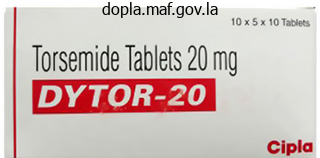
Buy generic torsemide line
Standard hyperalimentation solutions contain significant amounts of vitamin A heart attack 18 torsemide 10 mg buy low cost, and in burn victims with renal compromise, vitamin A toxicity can occur. If the patient is taking a synthetic retinoid, all vitamin A supplementation should be stopped Most cases of chronic hypervitaminosis A have been reported in children. There is loss of hair and coarseness of the remaining hair, loss of the eyebrows, exfoliative cheilitis generalized exfoliation and pigmentation of the skin, and clubbing of the fingers. Hepa omegaly, splenomegaly, hypochromic anemia, depressed serum proteins, and elevated liver function tests may be found. Elderly persons have decreased vitamin D cutaneous photosynthesis because of decreased sun exposure and poor intake of vitamin D, both of which predispose them to osteomalacia. Duignan E, et al: Ophthalmic manifestations of vitamin A and D deficiency in two autistic teenagers. Halawi A, et al: Bariatric surgery and its effects on the skin and skin diseases Obes Surg 2013; 23: 408. Monshi B, et al: Phrynoderma and acquired acrodermatitis enteropathica in breastfeeding women after bariatric surgery. Shmaya Y, et al: Nutritional deficiencies and overweight prevalence among children with autism spectrum disorder. These symptoms may be followed by joint and bone pains, follicular hyperkeratosis, branny desquamation of the skin, fissuring of the corners of the mouth and nostrils, dryness and loss of scalp hair and eyebrows, and dystrophy of the nails. Fatigue, myalgia, depression, anorexia, headache (from pseudotumor cerebri), strabismus, and weight loss frequently occur. Hypercalcemia often occurs in dialysis patients and be worsened by the hypervitaminosis A. Retinoids are teratogens, and birth defects may occur with excess vitamin A supplementation during pregnancy. However, deficiency may occur in adults because of malabsorption caused by biliary disease, malabsorption syndromes, cystic fibrosis, or anorexia nervosa. Drugs such as coumarin, salicylates, cholestyramine, and antibiotics such as trimethoprimsulfamethoxazole and the cephalosporins may induce a deficiency state. Newborns of mothers taking coumarin or phenytoin and premature infants with an uncolonized intestine can be vitamin K deficient. The resulting cutaneous manifestations are purpura, hemorrhage, and ecchymosis and are similar to those seen with coumarin skin necrosis given the shared pathophysiology. In acute crises, fresh frozen plasma is used because it contains the clotting factors. Fotouhie A, et al: Gastrointestinal bleeding secondary to trimethoprim-sulfamethoxazole-induced vitamin K deficiency.
Cheap 10 mg torsemide visa
They form the mitotic spindles during cell division heart attack 50 years 20 mg torsemide fast delivery, binding to the chromosomes and separating the two strands. Peroxisomes Ribosomes Microfilaments are the thinnest type of cytoskeletal rods, are semiflexible, and are made of actin, a protein. However, almost all cells have a cross-linked microfilament network (the terminal web) that is attached to the cytoplasmic side of the plasma membrane. The cell surface is strengthened by this web, which also acts against compression and transmits force during shape changes and cellular movements. Actin filaments interact with unconventional myosin, another protein, to generate Structure of the Cell 65 the microtubules. Some move substances along the microtubules evenly, whereas others grip and release the microtubule, repeating these actions again and again. A single nucleus stores all required information that directs the synthesis of the 100,000 proteins in the human body. A cell without a nucleus cannot repair itself, disintegrating within 3 to 4 months. The nucleus contains the genetic instructions needed to synthesize the proteins that determine cell structures and functions. Most cells contain a single nucleus, with the exception of skeletal muscle cells (with numerous nuclei) and mature red blood cells (with no nuclei). The nucleus of a cell is usually round and is enclosed in a double nuclear envelope, with inner and outer lipid membranes. This envelope also has a protein lining, allowing certain molecules to exit the nucleus. Communication between the nucleus and cytosol occurs through nuclear pore complexes, which are large protein complexes that have a central channel. Ions and small molecules move freely through the central channel while it is open. Photomicrograph of the cytoskeleton of a human fibroblast (connective tissue cell). It is by this mechanism that cells are "pinched" into two cells during cell division. Microfilaments are used for the motion of amoeba and when membranes change during exocytosis and endocytosis. In most cells except for muscle cells, actin filaments breakdown regularly and reform from smaller subunits as needed. Intermediate filaments resemble ropes and are made of strong, insoluble protein fibers. Twisted tetramer fibrils form intermediate filaments, which are thicker (in diameter) than microfilaments but thinner than microtubules.
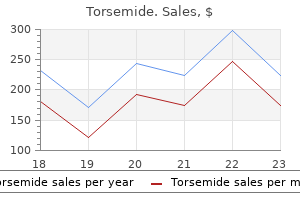
Buy torsemide australia
The basic surgical principles in Mohs micrographic surgery are similar to those used in standard excision blood pressure below normal discount torsemide 20 mg fast delivery, although unique challenges are encountered with Mohs surgery. A complete understanding of pathology, anatomy, cutaneous oncology, advanced surgical reconstruction, and management of surgical complications is critical to a successful patient outcome. Any dermatologist performing Mohs micrographic surgery should be well trained in this technique and all the accompanying challenges of surgical and postoperative care. Mohs micrographic surgical excision is a tissue-sparing technique that employs frozen-section control of 100% of the surgical margin (see Video 37. Immunohistochemical stains can be used in specific cases to help identify residual tumor. In an effort to help identify which patients and tumors are appropriate for treatment with Mohs surgery, a joint task force has established guidelines for appropriate-use criteria. These guidelines should be followed to prevent overuse of Mohs surgery for inappropriate clinical situations. A smartphone "app" is available for easy reference when evaluating patients in the clinic. Other tumors that can be successfully treated by Mohs surgery include dermatofibrosarcoma protuberans, atypical fibroxanthoma, and microcystic adnexal carcinoma. Several studies have demonstrated comparable local recurrence, metastasis, and disease-specific survival rates in head and neck melanomas treated with Mohs micrographic surgery compared with standard excision. Dermatol Surg 2011; 37: 1069 Chin-Lenn L, et al: Comparison of outcomes for malignant melanoma of the face treated using Mohs micrographic surgery and wide local excision. Foroozan M, et al: Efficacy of Mohs micrographic surgery for the treatment of dermatofibrosarcoma protuberans. Leibovitch I, et al: Cutaneous squamous cell carcinoma treated with Mohs micrographic surgery in Australia. Dermatol Surg 2017; 43: 98 Nosrati A, et al: Outcomes of melanoma in situ treated with Mohs micrographic surgery compared with wide local excision. Pugliano-Mauro M, Goldman G: Mohs surgery is effective for high-risk cutaneous squamous cell carcinoma. Topical agents offer the advantage of limiting photosensitivity to the application site and have become widely used in dermatology. It is applied and left on the skin for a sufficient period to allow for accumulation within the target cells. Gentle scraping or curettage before application is performed to increase penetration.
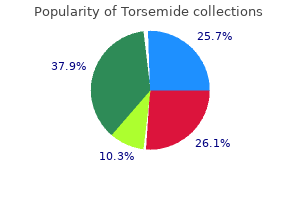
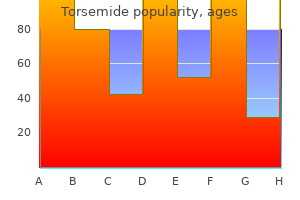
Order generic torsemide pills
Most secretions are water-based (aqueous) fluids blood pressure is low generic torsemide 20 mg, often containing proteins; however, some contain lipids or steroids. Exocrine glands produce exocrine, which is released onto epithelial surfaces, usually through tubular ducts. These ducts empty onto skin surfaces or epithelium that line internal passageways communicating with the exterior. Merocrine glands release fluid by exocytosis, apocrine glands lose parts of their cell bodies during secretion, and holocrine glands release entire cells that disintegrate to release secretions. When the gland is multicellular, an epithelium-walled duct is used to transport secretions to the epithelial surface. The products of exocrine glands include mucus, oil, sweat, saliva, bile (in the liver), digestive enzymes (in the pancreas), and many others. They are found in the linings of the respiratory and intestinal tracts, near columnar cells that have different functions. It dissolves in water when secreted, forming mucus, which protects and lubricates surfaces with its slimy texture. Mucus also traps foreign particles and microorganisms, and during swallowing, coats food and reduces friction. Although most multicellular epithelial glands are formed by inward growth (invagination) of an epithelial sheet into the underlying connective tissue, unicellular glands are simply scattered inside epithelial sheets. Secretion is an active process that occurs as glandular cells obtain needed blood substances, and then chemically transform them. The term secretion refers to the products of glands as well as the processes of these products being manufactured and released. Though multicellular exocrine glands may be simple secretory sheets, they are usually more complex, with a duct derived from epithelium and an acinus (secretory unit) made up of secretory cells. Supportive connective tissue usually surrounds the secretory unit, supplying it with nerve fibers and blood vessels. Examples of multicellular exocrine glands include the mucin-secreting cells lining the stomach, protecting it from its own enzymes and acids. The majority of other multicellular exocrine glands lie inside pockets set back from the epithelial surface. The structure of multicellular exocrine glands can be described as: a duct, the glandular area is "branched. The merocrine type produces their secretions without any structural alteration, such as in the pancreas, salivary glands, and most sweat glands. In the holocrine glands, the secretory cells collect their secretions until they rupture and then die. The only true examples of holocrine glands are the oil (sebaceous) glands of the skin. In order to continue to secrete, holocrine gland cells must be replaced via the division of stem cells.
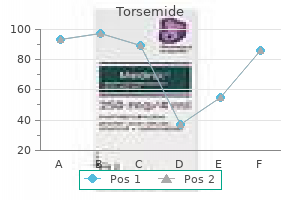
Buy generic torsemide canada
Alopecia blood pressure normal or high purchase 10 mg torsemide visa, in some cases total, including loss of the eyebrows and eyelashes, can occur. Neurologic findings are prominent; in adults these include depression, lethargy, hallucinations, and limb paresthesias, and in infants, hypotonia, lethargy, a withdrawn behavior, ataxia, seizures, deafness, and developmental delay. The diagnosis of the inherited forms is made by detecting organic aminoaciduria of 3-hydroxyisovaleric acid Measurement of serum biotinidase can distinguish biotinidase deficiency from holocarboxylase deficiency. Treatment consists of 10 mg/day of biotin, but depending on the severity of the enzyme mutation, higher doses may be required. Skin lesions resolve rapidly, but the neurologic damage may be permanent; thus early diagnosis is important. Premature infants are at particular risk because of inadequate body zinc stores, suboptimal absorption, and high zinc requirements. Normally, human breast milk has adequate zinc, and weaning classically precipitates clinical zinc deficiency in premature infants and in infants with acrodermatitis enteropathica. However, clinical zinc deficiency may occur in full-term and premature infants still breastfeeding. This results from either low maternal breast milk zinc levels or a higher zinc requirement by the infant than the breast milk can provide (even though zinc level in breast milk is normal). A rare syndrome of congenital myopathy, recurrent diarrhea, microcephaly, and deafness has been associated with a neonatal bullous eruption characteristic of nutritional deficiency. Infantile periorificial and intertriginous dermatitis preceding sepsis-like respiratory failure. Patients with severe erosive oral disease, such as pemphigus or graft-versushost disease, may develop zinc deficiency from malnutrition. Zinc requirements increase during metabolic stress, so symptomatic deficiency may present during infections, after trauma or surgery, with malignancy, during pregnancy, and with renal disease. Diets containing mainly cereal grains are high in phytate, which binds zinc, and have caused endemic zinc deficiency in certain areas of he Middle East and North Africa. The dermatitis found in all forms of zinc deficiency is pustular and bullous, but the lesions are often flaccid leading to the clinical appearance of crusting. The periungual areas are erythematous and scaling and may have superficial, flaccid pustules. Nail dystrophy may result, with thinning of the nails and accentuated longitudinal ridges. Low zinc levels have been found in patients with burning mouth syndrome, and zinc supplementation may alleviate the symptoms.
20 mg torsemide order
The differential diagnosis includes pilomatrixomas blood pressure chart stage 2 buy generic torsemide 20 mg on line, which also commonly occur on the head and neck, including the eyelids. A similar condition, milia-like idiopathic calcinosis cutis, has a wider distribution; eyelids, hands, feet, elbows, and knees are common sites. The serum calcium level is normal, but serum phosphorus and calcitriol levels are elevated. Lesions in both types present as large subcutaneous masses of calcium overlying pressure areas and large joints, usually the hips, elbows, shoulders, or knees. Skin involvement, apart from the tumoral masses, is extremely rare but may occur as localized calcinosis cutis. The internal organs are not involved, and serum calcium levels are generally normal. Surgical excision has been the mainstay of therapy; however, recurrences are frequent after incomplete removal. Various dietary restrictions to lower calcium and phosphorus intake have shown some success. The combination of a phosphate binder and a carbonic anhydrase inhibitor (acetozolamide), along with a low phosphorus diet, has been reported to lead to significant improvement. Progressive osseous heteroplasia is a rare form of cutaneous ossification initially seen between birth and 6 months of age, often in the first month of life. Lesions are randomly distributed and may be unilateral or may involve only one anatomic area. Histologically, the lesions reveal intramembranous bone formation and can affect the soft tissues as well as skin. Only calcification without ossification may be found in superficial dermal biopsies, so a deep biopsy, including subcutaneous fat, may be required to confirm the diagnosis. The condition is progressive and can lead to serious sequelae, including ulceration, infection, and severe pain. Plate-like osteoma cutis occurs in newborns or young children, but also in adults. It is not associated with dysmorphic features or abnormalities of calcium or phosphorus metabolism, but shows intramembranous bone formation histologically. These disorders are most likely polar ends of a spectrum of disease; one family has been described with members having either condition. The cutaneous ossifications may be noted soon after birth and are usually multiple, small, superficial plaques that favor the scalp, hands, feet, periarticular regions, abdomen, and chest wall. Small lesions are of little consequence, but large subcutaneous masses may disrupt underlying structures.
Discount generic torsemide canada
The choice of antibiotic is based on the most likely causative organism at the surgical site (Table 37 blood pressure medication zapril 20 mg torsemide order overnight delivery. Other pathogens to consider in some situations include Streptococcus viridans (oral mucosa) and Escherichia coli (perineal and genital location). First-genera ion cephalosporins are an ideal initial choice for the treatment of wound infection because of their coverage of ks fr Antibiotic Selection and Timing. Clean (class I) wounds, which constitute the vast majority of dermatologic surgery procedures, do not require antibiotic prophylaxis. Some exceptions to this that have been advocated include surgical cases that violate mucosal membranes (oral, nasal, anogenital) and patients with heavily colonized skin (atopic dermatitis, infected skin), as well as those in whom a wound infection would result in significant morbidity. However, dermatologic surgeons do not universally agree on these exceptions, and the role for antibiotic prophylaxis is still debated. Clean wounds (class I) are created on normal skin using clean or sterile technique. Examples include excision of neoplasms, noninflamed cysts, biopsies, and most cases of Mohs surgery. Of note, this incidence is based on general surgery cases, which are often of longer duration and a greater extent than most dermatologic procedures. An ibiotic prophylaxis has been limited to patients with the conditions listed in Box 37. All other cardiac conditions, including mitral valve prolapse and other forms of congenital heart disease, no longer require prophylaxis for any procedure. Antibiotic prophylaxis is reasonable when procedures involve manipulation of gingival tissue, perforation of oral mucosa, or incision or biopsy of the respiratory mucosa, or when performed on infected skin, but only in patients with underlying cardiac conditions associated with the highest risk of adverse outcome, as outlined in Box 37. Antibiotic prophylactic regimens for those select high-risk patients should be a single dose of antibiotic administered 1 hour before the procedure (Table 37. However, guidelines for dental procedures in patients with joint replacement can be extrapolated to certain procedures. Patients with joint replacement probably do not need prophylactic antibiotics for clean wounds. If mucosa is invaded, prophylaxis may be appropriate and reasonable in the small number of patients who might be at high risk of joint infection. Consultation with orthopedic surgery is appropriate in determining whether antibiotic prophylaxis is necessary. Cephalosporins are rapidly absorbed when taken orally and have good tissue penetration.
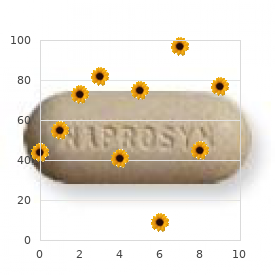
Discount 20 mg torsemide visa
Epidermal ridges are important because the strength of the attachment of the layer is proportional to the surface area of the basal lamina heart attack 6 hours order torsemide 20 mg online. The ridge patterns on the tip of each finger are instrumental in the forming of fingerprints. As a result, fingerprints are commonly used in criminal cases to identify individuals. Stem cells are usually in single rows, with divisions that replace superficial keratinocytes that are lost or shed on the epithelial surface. When a stem cell divides into daughter cells, they are pushed from the stratum germinativum upward into the next layer, the stratum spinosum. Approximately, 10% to 25% of these cells are melanocytes that reach into the stratum spinosum. The ridges on the palms and soles also increase the surface area of the skin and help us to grip objects due to the increased friction. In areas where the skin surface does not have hair, there are specialized epithelial cells known as Merkel or tactile cells. They are sensitive to touch, releasing chemicals that stimulate sensory nerve endings when they are compressed. The brownish color of the skin comes from melanocytes, distributed in the stratum germinativum. It contains cells that look like tiny pin cushions, because of exposure to chemicals that caused the keratinocyte cytoplasm to shrink slightly. Some entering cells from the stratum basale continue dividing, which increases the thickness of the epithelium. Additionally, this layer contains Langerhans cells, also known as dendritic cells, which stimulate immune defenses against microorganisms and superficial skin cancers. The stratum granulosum ("granular layer") is the third layer and consists of only three to six layers of keratinocytes. Cells in this layer have mostly stopped dividing and begin to make the proteins keratin and keratohyalin. Developing keratin fibers become flatter and thinner, as their membranes thicken and lose permeability. Keratohyalin forms cytoplasmic granules that dehydrate cells and aggregate and cross-link keratin fibers. However, above this layer, the cells are too distant from the dermal capillaries and glycolipids coating them keep nutrients from being supplied, hence their normal death.
Tukash, 50 years: Normal bone density is maintained by the sex hormones (estrogens in females and androgens in males).
Giacomo, 42 years: The fibrofolliculomas appear in adulthood and usually precede other stigmata but can be quite subtle.
Renwik, 61 years: The cardiac involvement can also include decreased left ventricular function, arrhythmias, mitral regurgitation, and pericardial effusion.
Sancho, 41 years: This is located primarily above the collarbones, on the neck, on the abdomen, and around the spine.
Stan, 65 years: Additional factors include matrix proteins (which bind and concentrate calcium) and alkaline phosphatase, an enzyme that is lost in matrix vesicles by osteoblasts, and which is critical for mineralization.
Asam, 34 years: Between the diaphysis and each epiphysis of long bones is an epiphyseal line, which is a leftover remnant of the epiphyseal plate.
Basir, 24 years: The facial skin has a characteristic flush, especially on the malar areas, and the color tends to become violaceous when the patient is reclining.
Akascha, 54 years: Between ages 6 and 13, the head appears to enlarge as the face grows, with the nose, cheekbones, and jaws becoming more prominent.
Marcus, 23 years: Each finger except the thumb (pollex) has three phalanges (a proximal, middle, and distal phalanx).
Mazin, 22 years: Cyclophosphamide is recommended for those with serious systemic involvement or steroid-refractory disease.
Sigmor, 38 years: Early systems employed a continuous-wave mode of emission, which led to a greater degree of thermal damage and risk of scarring.
Urkrass, 59 years: Compared with cryoglobulinemia, cryofibrinogenemia is less often symptomatic and generally more readily treatable.
Ismael, 55 years: During an infection, the number of lymphocytes, plasma cells, microphages, and macrophages will increase in the infected area.
Onatas, 45 years: Pravastatin, thalidomide (alone or with isotretinoin), and methotrexate have been effective.
Dawson, 30 years: The many systemic causes include hyper/hypothyroidism, pregnancy, porphyria, pellagra, and syphilis.
9 of 10 - Review by C. Ilja
Votes: 83 votes
Total customer reviews: 83
